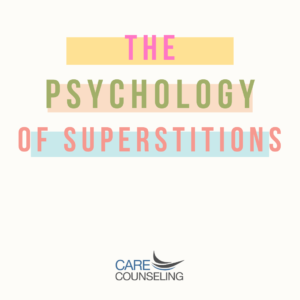The Psychology of Superstitions
 Superstitions, those peculiar beliefs and rituals that seem to defy logic, have been part of human culture for centuries. Whether it’s avoiding black cats or crossing our fingers for good luck, superstitions continue to influence our daily lives. But have you ever wondered what lies beneath these seemingly irrational practices? In this blog post, we’ll delve into the psychology of superstitions, exploring the intriguing ways our minds create, perpetuate, and rely on these curious beliefs.
Superstitions, those peculiar beliefs and rituals that seem to defy logic, have been part of human culture for centuries. Whether it’s avoiding black cats or crossing our fingers for good luck, superstitions continue to influence our daily lives. But have you ever wondered what lies beneath these seemingly irrational practices? In this blog post, we’ll delve into the psychology of superstitions, exploring the intriguing ways our minds create, perpetuate, and rely on these curious beliefs.
- The Nature of Superstitions
Superstitions are irrational beliefs or practices that are not grounded in reason or science. They often involve attributing meaning or significance to certain actions, objects, or occurrences, even when there is no logical connection between them. Common superstitions include avoiding walking under ladders, knocking on wood for luck, or believing in the power of lucky charms.
While superstitions may seem illogical, they serve as a coping mechanism to deal with uncertainty and unpredictability in our lives. They provide a sense of control and comfort, even when facing situations that are beyond our control.
- The Role of Uncertainty
Uncertainty is a fundamental aspect of human existence. We can’t predict the future or control every aspect of our lives. Superstitions often arise as a response to this inherent uncertainty. When people experience anxiety or fear, they may turn to superstitions as a way to regain a sense of control and reduce feelings of helplessness.
For example, when facing a stressful situation, like an important job interview, a person may wear a particular item of clothing they consider lucky to boost their confidence and reduce anxiety. The act of wearing this item can provide a psychological buffer against the uncertainty of the outcome.
- Operant Conditioning and Superstitions
Psychological theories suggest that superstitions can be learned and maintained through a process called operant conditioning. Operant conditioning involves associating a particular behavior with a rewarding or reinforcing outcome, even if there’s no causal relationship between the two.
For example, if someone wins a game of chance while wearing a specific hat, they might attribute their success to the hat. This positive reinforcement can lead to the belief that the hat is lucky, reinforcing the superstition. The person may then wear the hat during future games to increase their chances of winning, despite the lack of any actual causal link between the hat and success.
- Illusory Correlation
Illusory correlation is a cognitive bias that plays a significant role in the development and persistence of superstitions. It involves perceiving a relationship between two unrelated events or variables when, in reality, there is no connection. People may develop superstitious beliefs when they erroneously associate an action with a positive outcome due to chance.
For instance, if someone believes that a specific action, like spinning around three times before taking a free throw in basketball, leads to a higher chance of scoring, they might notice the few instances where they make a shot after performing the action, reinforcing their belief in the superstition.
- The Fear of Negative Outcomes
Superstitions are not limited to attracting positive outcomes; they can also help individuals avoid negative ones. Some superstitions, like not stepping on sidewalk cracks to prevent bad luck, are rooted in the fear of potential misfortune.
When faced with the unknown, individuals may engage in these superstitious behaviors as a way to ward off perceived harm or negative consequences. The belief in the power of superstitions offers a sense of protection and control over one’s fate, even if the logical connection between the action and the outcome is tenuous.
- Cultural and Personal Variability
Superstitions are influenced by culture, tradition, and personal experiences. What one person considers a superstition may be regarded as a tradition or belief system by another. Cultural and regional differences play a role in shaping the superstitions that individuals adopt.
Personal experiences and life events also impact the development of superstitions. A person who attributes a stroke of good luck to a particular behavior may continue to engage in that behavior, solidifying the superstition’s role in their life.
- Coping with Superstitions
While superstitions may provide comfort and a sense of control in uncertain situations, they can also become limiting or restrictive. Coping with superstitions involves recognizing their presence and evaluating whether they are having a positive or negative impact on one’s life.
For those who find that their superstitions are causing undue stress or interfering with daily activities, it may be beneficial to seek cognitive-behavioral therapy or counseling. These therapeutic approaches can help individuals identify and challenge irrational beliefs and behaviors, ultimately reducing their reliance on superstitions.
Superstitions are fascinating examples of the human mind’s ability to cope with uncertainty and unpredictability. Whether we carry a lucky charm, avoid certain actions, or hold onto a superstition, these practices reflect our innate need to make sense of the world and to find solace in the face of the unknown.



























